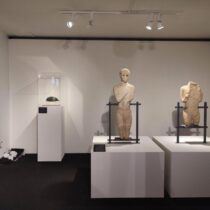Under the supervision of Vassilis Moskovis thirteen students of either sex translated Plutarch’s book “Concerning the education of children”. This project was related to “Paedagogical Research”, a lesson taught at the Paedagogical Department of Primary Education, Athens University, during 1986 and 1987. Plutarch defines the rules for the proper upbringing of free and well-to-do children. He begins, opportunely as follows: The father must not be drunk at the time of conception, and the mother should breastfeed her baby herself. Three factors ensure a virtuous life: A natural predisposition (towards such a life), logic (cultivating the intellect) and habit (training). Great attention is given to the choice of teacher. The child should get through his general education rapidly, in order to then devote himself to philosophy. In Plutarch’s eyes, he who harmoniously combines an engagement in politics alongside philosophy, achieves perfection.
The training of memory is very important. Physical development should not be neglected. Children should be encouraged to do good deeds through persuasion because corporal punishment is only fit for slaves.
General instructions are given to the young. They should not be antisocial, they should live modestly, hold their tongues, master their anger and keep their hands clean. Flatterers are condemned.
As for pederasty,the lovers of Theba, Iliada and Crete are condemned, while lovers of the soul are praised.
Plutarch includes a series of allegorical phrases by Pythagoras that help achieve virtue. A father is obliged to be an example to his child.


